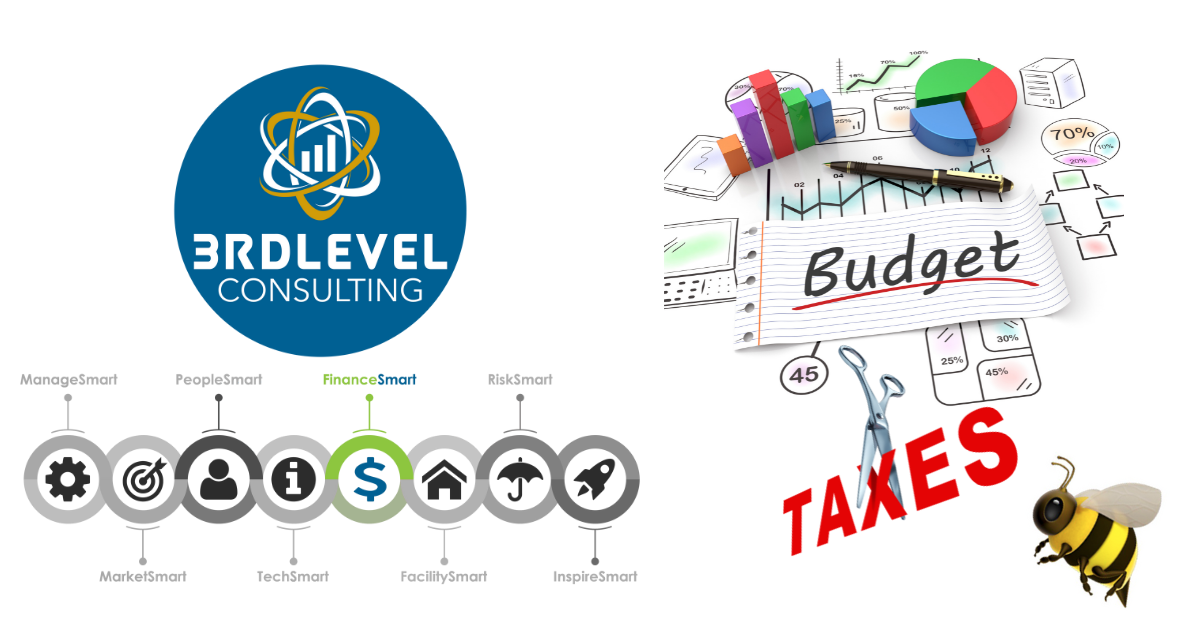It’s that time again! Tax planning time! No matter whether you are reading this in January or November, it is ALWAYS time to be tax planning. Although, the 4th quarter of your fiscal year is a very critical time for planning and should get extra attention from you!
Keeping tax planning in the forefront all year will allow for more preparedness so that your fiscal year’s 4th quarter has less of a chance of sneaking up on you. Make sure to take a look at the first blog in the FinanceSmart Blog Series – Business Finance 101 – What Every Business Owner Must Know.
Your Accountant
It is critical to have an excellent accountant who is versed in working with similarly structured businesses and who stays on top of the tax code. Whether you are a do-it-yourselfer or you subcontract your bookkeeping/accounting, it’s your business, so you must stay informed.
At minimum, you should have an annual tax planning meeting with your accountant and quarterly check-ins. Depending on your needs, something more or less frequent may work for you. For your annual tax planning meeting, review projections for both personal and corporate returns (depending on business structure and filing status).
Some topics you may want to cover at your tax planning meetings / check-ins
- Annual income projections
- P&L year-over-year comparison
- Upcoming changes to the IRS Tax Code or State/Municipality Tax Code(s)
- Changes to your financial situation, such as:
- Sale of real estate
- Spouse pay increase / decrease
- Major purchases both personal and business
- Review any suggested actions to take before your fiscal year-end
- Potential red flags and remedies
How to Prepare
You need time between now and the end of your fiscal year to change your tax situation by putting in place any strategies that are applicable to you (such as purchasing of equipment, retirement plan contributions, updates to payroll, prepayment of taxes, etc.) Check out this checklist from Intuit/QuickBooks for step-by-step tax prep recommendations.
Every year changes are made to the tax code. Sometimes these changes can come in the final days of a year. With the help of your accountant, you should always be considering changes and any other unique situations that may impact your business. Learn about any new tax rules. Refer to your accountant, financial advisor and official documentation from the IRS.gov website for the most accurate interpretation as these rules and changes can often be extremely complex and a challenge to decipher.
Here are some examples of things that can change:
- Rules for certain business expenses such as changes to food and beverage deductions
- Relaxed Limits such as CARES in 2021
- Excess Business Losses
- Employee Retention Credit
- Deductions for Charitable Contributions
- Home Office Deduction
- Claim First-Year Bonus Depreciation
- Unique situations such as some of the COVID relief programs
- Mileage Deduction Amount
Because deductions need to be planned, make sure that you are watching your expenses (deductions) all year long. One of the best ways to do this is to stay on top of your monthly bookkeeping to help you tally up your deductions. Waiting until the last minute and trying to piece things together at year-end is a recipe for disaster. Making sure to stay on top of all record keeping tasks helps ensure missing out on tax savings doesn’t happen.
If you’re looking for a list of small business tax deductions, we like this one, but remember to always check with your tax professional too!
Doing Your Homework
In our Business Finance 101 blog, we reviewed Financial Reporting Basics. Being familiar with your financial statements on a monthly basis is crucial. Staying on top of what is normal for your business will alert you when something isn’t quite right which will allow you to quickly make adjustments.
Reviewing reports, projecting future performance and evaluating operating percentages will put you in the best position for accurate budgeting. Similar to a corporate financial planner, you can project profitability and cash flow using historical trends to make assumptions. Projections are invaluable in making budget decisions and planning finances. Operating percentage trends should be reviewed for the overall company and by Department/Program and/or Facility, depending upon how you desire to measure it. If you would like assistance with reviewing your reports and creating projections, we are here to help. Connect with us here.
To start, compare the Current Month, Quarter and the Year-To-Date figures side by side for each income and expense category. Trend each category over the past 2-3 years, broken down by each period and area. Note or exclude unusual circumstances if necessary (i.e., COVID Shutdown, Economic Changes, large unexpected expenses ).
As an exercise to get your own brain moving (no, QuickBooks will not do this for you, although it does do automatic budgeting based on past financials), try this:
Use all of the above, plus BUDGET TO ACTUAL YTD
and ROLLING 12 MONTH PROFIT AND LOSS Statements
to project your cash balance six (6) months from today.
This can be based on past trends, current balances, and other factors that you can foresee in today’s economic environment. You may also have to consider the growth and decline of certain programs or industries, as well as the national and local economies. Track your accuracy to projection month to month to continue to enhance your projection and budgeting skills.
Remember, prior to every tax planning meeting, review all of your reports. Look at your cash position and current P&L to allow for determination of any additional expenditures such as; bonuses, purchases, distributions, etc.
Bonuses: Are you in a position to provide bonuses and reward staff?
In our Keeping Employees Engaged and Happy blog, we address and review several creative strategies to retain those one-of-a-kind, exceptional employees. Ideally, you are able to reward with bonuses or raises in pay. We will touch on bonuses here just as a reminder that to be competitive as an employer, planning for bonuses is a key part of your budgeting, planning and projections.
Decide HOW do you want to reward people for positive business behaviors?
- Spontaneous bonus
- Bonuses tied to specific objectives (there are a multitude of these)
- Student or program numbers
- Student or program dollars
- Net profit
- Quality-oriented objectives
- Profit-sharing tied to the entire Company’s performance (teams)
- Profit-sharing tied to the performance of a particular program or division
- A combination of any or all of the above
Remember, that there are a WIDE VARIETY of compensation methods, and that you should be tracking total compensation for all employees as part of your HR processes.
Knowing your financial health and having a plan to stay on top of it moving forward is rewarding and helps reduce your stress level. 3rd Level Consultants can help you stay on track so the end-of-the year does not ‘catch you by surprise’. Connect with us to schedule a free online session to discuss your specific business needs and the resources we have to help you achieve your goals.
Meet The Contributors
The contributors have successfully served children’s activity centers, gymnastics gyms, dance studios, cheer gyms and swim schools worldwide for 35+ years.



